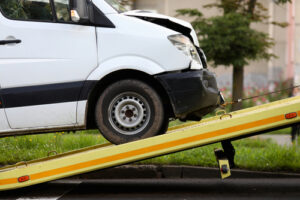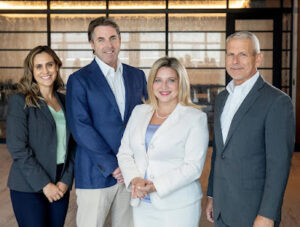Can I Sue Amazon Directly for a Truck or Van Accident?
Yes, you may sue Amazon directly for an accident involving one of its delivery trucks or vans, even if the driver worked for a separate company. Recent court verdicts, including multi-million dollar awards against Amazon, show that juries are increasingly willing to hold the company responsible for the actions of its delivery drivers.
The process is not straightforward. Amazon built its delivery network using a model of third-party Delivery Service Partners (DSPs) specifically to limit its direct liability in these situations. They will argue that the driver is an independent contractor, not an Amazon employee, but a Tampa truck accident lawyer can challenge these arguments and fight for your rights.
To succeed, your case must prove that Amazon exercised significant control over the driver’s work or was negligent in how it selected and monitored its delivery partners.
If you have questions about an accident involving an Amazon delivery vehicle in Florida, call Boohoff Law, P.A for a no-cost consultation at (813) 445-8161.
Table of Contents
ToggleThe “Independent Contractor” Shield: Why Suing Amazon Is Different
 The company has designed a complex system of third-party partners, creating a legal buffer that is confusing for injury victims. It’s a setup that makes seeking compensation for Amazon truck accidents a distinct challenge, which is why many people choose to hire a truck accident attorney to guide them through the process and fight for fair compensation.
The company has designed a complex system of third-party partners, creating a legal buffer that is confusing for injury victims. It’s a setup that makes seeking compensation for Amazon truck accidents a distinct challenge, which is why many people choose to hire a truck accident attorney to guide them through the process and fight for fair compensation.
What is Amazon’s Delivery Service Partner (DSP) Program?
At the heart of Amazon’s delivery machine is its DSP program. The company contracts with thousands of smaller, independent companies to handle the “last mile” of delivery, that final step of getting a package from a local warehouse to your doorstep. These DSPs are the ones who hire the drivers, own or lease the familiar blue vans, and manage the day-to-day scheduling and logistics.
From Amazon’s perspective, this model creates a legal shield. When a crash happens, their initial defense is almost always the same: “The driver doesn’t work for us. They work for XYZ Delivery, LLC, an independent contractor.”
What Does “Independent Contractor” Mean in This Context?
The legal concept is straightforward on the surface: generally, a company is not responsible for the negligent acts of an independent contractor. Think of it like hiring a plumber to fix a leak in your home. If that plumber accidentally causes a flood in your neighbor’s apartment while on the job, you typically aren’t legally responsible for that damage; the plumber’s business is. Amazon attempts to apply this same logic to its massive delivery network, arguing that the DSP is the responsible party, not them.
How Does This Defense Impact Your Claim?
This defense complicates the process significantly. Instead of pursuing a claim against a multi-billion dollar corporation, you may first be directed to a small DSP that has limited insurance coverage.
These smaller companies frequently lack the resources to cover the full cost of serious injuries, which leaves you with unpaid medical bills and other financial losses. This is the central challenge that must be addressed to secure fair compensation.
Cracks in the Shield: How Amazon’s Control Creates Liability
Does Amazon’s argument that its drivers are independent contractors hold up in court? Increasingly, the answer is no. Courts and juries are beginning to look past the official job title on paper and examine the reality of the relationship between Amazon, the DSP, and the driver behind the wheel, which is why you may need a truck accident lawyer to build a strong case on your behalf.
The key question is not what the contract says, but the degree of control Amazon exercises over the driver’s work. When a company dictates nearly every aspect of a worker’s day, the line between contractor and employee begins to blur.
What Does “Control” Look Like in Practice?
To establish a link between Amazon and the driver, we investigate several areas to show that Amazon acts like an employer, even if it doesn’t directly sign the driver’s paycheck.
- Mandatory Technology and Surveillance: Drivers are typically required to use Amazon’s proprietary “Rabbit” handheld device, which dictates their every move. The system sets the route, tracks their location in real-time, and monitors their pace. Furthermore, Amazon installs AI-powered cameras in many vans that monitor drivers for actions like yawning or looking at their phone.
- Strict Performance Metrics: Amazon is known for setting demanding delivery quotas, sometimes requiring drivers to deliver 250-400 packages in a single shift. Failure to meet these targets leads to the DSP being penalized or even losing its contract. This creates immense pressure on drivers to rush, speed, and skip necessary rest breaks, which leads to dangerous driving.
- Control Over Hiring and Firing: While the DSP is the technical employer, Amazon frequently has the power to “deactivate” a driver’s access to its system. This effectively removes them from the job, giving Amazon ultimate control over who is and is not delivering their packages.
- Uniforms and Vehicle Branding: Drivers wear Amazon-branded uniforms and operate Amazon-branded vans. This creates a clear public impression that they are Amazon employees, strengthening the argument that Amazon should be held responsible for their actions.
This level of control is the foundation for a legal argument called vicarious liability. Simply put, if a company has the right to control the way a worker performs their job, it is held responsible for that worker’s actions on the job.
Two Paths to Justice: Legal Strategies for Holding Amazon Accountable
When we handle a case involving an Amazon delivery vehicle, we typically explore two legal theories at the same time to build the strongest possible case for compensation for an Amazon truck accident.
Path 1: Proving an Employer-Employee Relationship (Vicarious Liability)
As mentioned previously, this strategy focuses on demonstrating Amazon’s extensive control over the driver. We use the legal doctrine of respondeat superior, a Latin term meaning “let the master answer.” This long-standing legal principle holds an employer responsible for the wrongful acts of an employee, as long as those acts occur within the scope of their employment.
Real-World Example: In an August 2024 case in Georgia, a jury found Amazon 85% responsible for a crash that injured a child, awarding the family $16.2 million. The jury agreed that Amazon’s control over its delivery partner was so complete that it was vicariously liable for the driver’s negligence.
Path 2: Proving Amazon Was Directly Negligent (Negligent Hiring and Retention)
This argument is different because it focuses on Amazon’s own carelessness. It says that even if the driver was a true independent contractor, Amazon itself was negligent in a way that led to your injury, raising the question many victims have: can a truck accident lawyer help prove this kind of negligence and fight for fair compensation?
- Negligent Hiring: We investigate whether Amazon knew, or should have known, that the DSP it contracted with was unsafe. For instance, if we show that Amazon hired a DSP with a known history of safety violations or a pattern of hiring unqualified drivers, we argue that Amazon itself was negligent for putting that company on the road.
- Negligent Retention/Supervision: We also look at whether Amazon continued to use a DSP after becoming aware that it was unsafe. If a DSP had a track record of multiple accidents and Amazon kept sending it work, that is a form of direct negligence. Amazon’s own systems track driver behavior, so they are aware of dangerous patterns long before a serious crash occurs.
Real-World Example: Following a devastating crash on I-35, multiple lawsuits were filed against Amazon. The complaints allege that Amazon’s own hiring and monitoring practices were negligent. The plaintiffs argue that Amazon is responsible for hiring the driver and accuse him of having a history of reckless driving and safety violations, including multiple “hours of service” violations in the weeks leading up to the collision.
Building the Case: What Evidence Do We Need?
 Our process for gathering evidence includes making formal legal demands for a wide range of documents and data:
Our process for gathering evidence includes making formal legal demands for a wide range of documents and data:
- The Driver’s Records: This includes the driver’s complete driving history, training certifications, employment file, and any records of drug or alcohol testing.
- The DSP’s Company Records: We demand to see their hiring practices, vehicle maintenance logs, insurance policies, and any records of past safety violations or citations.
- Amazon’s Internal Documents: We seek the contract between Amazon and the DSP, performance metrics for both the driver and the DSP, and any internal communications related to safety issues or complaints.
- Electronic Data: This is some of the most compelling evidence. We seek the data from the “Rabbit” scanner showing the driver’s route, pace, and speed, as well as information from the van’s on-board telematics system and footage from the in-cab cameras.
- Accident Reconstruction: In many cases, we work with engineers and accident reconstruction specialists to scientifically recreate the crash scene. This demonstrates exactly how the driver’s actions, such as speeding to meet a delivery quota, were the direct cause of the collision.
- Regulatory Compliance: We check for compliance with federal regulations, such as the hours-of-service rules, which are designed to prevent driver fatigue by limiting driving time.
What Does Full Compensation Look Like in These Cases?
If you have been injured in an accident caused by the negligence of an Amazon delivery driver, our goal is to pursue the maximum compensation available under Florida law. This compensation is intended to cover every way the accident has rewritten aspects of your life, both financially and personally, and working with an accident lawyer to maximize your compensation can make a significant difference in the outcome.
Compensation in a personal injury claim typically falls into two main categories:
- Economic Damages: These are the direct and tangible financial losses you have suffered. They are calculated based on bills, receipts, and financial records. This includes:
- All past and future medical expenses, such as hospital stays, surgeries, physical therapy, and medication.
- Lost wages and income from being unable to work during your recovery.
- Loss of future earning capacity if your injuries are permanent and prevent you from returning to your previous job or earning the same income.
- Property damage, including the cost to repair or replace your vehicle.
- Non-Economic Damages: These are intended to compensate you for the intangible, personal losses that don’t come with a price tag but are just as real. This includes:
- Pain and suffering.
- Emotional distress and mental anguish.
- Loss of enjoyment of life (the inability to participate in hobbies and activities you once loved).
- Permanent scarring or disfigurement.
Every case is unique. The final value depends on the severity of your injuries, the strength of the evidence, and the specific facts of the crash. A knowledgeable attorney helps you understand the full scope of damages you may be entitled to claim, which is why experienced guidance is so important in truck accident claims.
Frequently Asked Questions About Amazon Truck Accidents
What should I do if Amazon’s insurance contacts me?
It is best to not give a recorded statement or sign any documents without first speaking to an attorney. The insurance adjuster works for the company, and their role is to protect the company’s financial interests. This may involve trying to get you to accept a low settlement offer or say something that could later be used to assign blame to you for the accident.
How long do I have to file a lawsuit in Florida?
In Florida, the statute of limitations for most personal injury claims is now generally two years from the date of the accident. You must act well before this deadline expires, as building a strong case against a large corporation like Amazon requires a significant amount of time for investigation and evidence gathering.
Do I still have a case if the Amazon driver was in a personal vehicle?
Yes. If the driver was an Amazon Flex driver using their own car to make deliveries, similar principles of control and negligence apply. We would investigate whether they were actively making deliveries and logged into the Amazon Flex app at the time of the crash to establish the link to Amazon’s business operations.
What if the accident happened on I-75 or another major highway in the Tampa Bay area?
Accidents on high-speed interstates involve more complex evidence and, unfortunately, more severe injuries. Our firm is familiar with the specific challenges of these cases. This includes understanding the need for accident reconstruction experts who analyze evidence from a multi-lane, high-speed highway collision to clearly establish fault.
Securing Accountability After an Amazon Accident
 Holding Amazon accountable for the actions of its delivery drivers is possible. However, it requires a legal team that understands the company’s complex business model and knows how to uncover the evidence that proves their control and negligence. We are prepared to handle these intricate investigations so you focus on what matters most: your recovery.
Holding Amazon accountable for the actions of its delivery drivers is possible. However, it requires a legal team that understands the company’s complex business model and knows how to uncover the evidence that proves their control and negligence. We are prepared to handle these intricate investigations so you focus on what matters most: your recovery.
The sooner we begin the process of preserving evidence, the stronger your case will be. You did not ask for this to happen, and you should not have to face a corporate legal team on your own.
If you were injured in an accident with an Amazon van or truck, call Boohoff Law, P.A today. One phone call is all it takes to get started. Contact us at (813) 445-8161.
Free Consultation
We Are Here For You 24/7
Reviews
– Elissa M.
“Really pleased with Boohoff Law! Received immediate responses when I had any questions. Treated amazingly by all staff … made this process a true breeze!”
– Caitlyn M.
– Brandy K.
Related Posts
I Was Partially At-Fault in a Rear-End Crash. Can I Still Get Compensation in Florida?
I Was a Passenger in an Uber Accident. What Are My Rights?
What Damages Can I Recover After a Jackknife Truck Accident?
Recovery is personal.
We’re here for you.
We’re close by. And if you can’t make it to us, we’ll meet you where you need us, at home or in the hospital.
You're better off with Boohoff.











The information on this website is for general information purposes only. Nothing on this site should be taken as legal advice for any individual case or situation. This information is not intended to create, and receipt or viewing does not constitute, an attorney-client relationship.
available 24/7
(877) 999-9999
